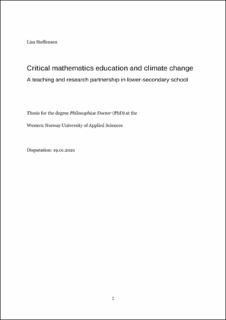| dc.contributor.author | Steffensen, Lisa | |
| dc.date.accessioned | 2022-10-24T14:05:05Z | |
| dc.date.available | 2022-10-24T14:05:05Z | |
| dc.date.created | 2021-02-11T08:58:23Z | |
| dc.date.issued | 2021 | |
| dc.identifier.citation | Steffensen, L. (2021). Critical mathematics education and climate change A teaching and research partnership in lower-secondary school (Doctoral dissertation, Western Norway University of Applied Sciences). HVL Open. | en_US |
| dc.identifier.isbn | 978-82-93677-30-7 | |
| dc.identifier.uri | https://hdl.handle.net/11250/3028014 | |
| dc.description | Paper IV is Reprinted/adapted by permission from Springer Nature: Integrated Approaches to STEM Education: An International Perspective, by Anderson, Judy, Li, Yeping (Eds.), ©2020. https://doi.org/10.1007/978-3-030-52229-2_15 | en_US |
| dc.description.abstract | This study took place at Western Norway University of Applied Sciences. The research question is: How can teachers facilitate students’ critical mathematical competencies in a climate change context? To enable students to act as critical citizens and empower them for a lived democracy is a crucial task for education. From a critical mathematics perspective, students can become aware of mathematics’ role in shaping society. They can be capable of critiquing the use of mathematics and applying mathematical competencies to empower themselves both personally and for the greater good of society.
The question contains four research focuses that are addressed in four individual papers. Research focus no. 1 identifies and critically reflects on concepts and perspectives emphasised as important in the literature of two fields – critical mathematics education and post-normal science – and is addressed in a literature overview (paper I). Research focuses 2, 3, and 4 involve a research partnership (papers II, III, and IV) with three teachers and their four classes in lower-secondary school. For about a year, 42 classroom lessons were designed by the teachers to develop students’ critical mathematical competencies in a climate change context. Research focus no. 2 involves how teachers’ values can influence their teaching by investigating their facilitation and reflections of value-aspect with respect to climate change and school mathematics. Research focus no. 3 identifies the potential for facilitating students’ awareness and understanding of the formatting power of mathematics. Lastly, research focus no. 4 identifies how students’ critical mathematical competencies can appear in their argumentation. This study has, therefore, a perspective on students’ critical mathematical competencies and how teachers facilitate them.
The findings from the four papers are structured and discussed in six themes. In the first theme, lived democracy and critical citizens, I discuss how the teachers connect climate change, students’ critical mathematical competencies, and democracy. They emphasise critical competencies as a crucial skill for students and treat the students as critical citizens by engaging them in discussion and debates. In the second theme, the mathematical formatting of climate change, I identified, amongst others, how the teachers express it as vital that students identify, understand and reflect on how mathematics can influence how we perceive climate change issues. I also discussed how teachers deliberate or un-deliberate that choices of graphs, numbers or topics can influence students or others.
In the third theme, critique and critical reflections, I identify how the teachers facilitate students’ critical reflections regarding mathematics-based argumentation in complex scientific issues. In addition, I explore how they prepare them to deal with uncertainties, consider implications of graphs, and include their critical agency in taking justified standpoints. In the fourth theme, mathematical literacy and kinds of knowing, I discuss students’ intertwined mathematical, technological, and reflective knowing. Examples of how students sometimes struggle to move beyond the mathematical borders of a task are contrasted with how they use their everyday knowledge and relate the task to the real-world. The students’ mathematical literacy is discussed in relation to local and global climate change concerns and 21st-century skills.
In the fifth theme, controversies and values, I identify how the teachers emphasise the controversies in climate change issues to deliberately create debate and reflections, instead of avoiding the controversies. In the sixth theme, student-centred and dialogic learning, I discuss six aspects characterising the learning environment in the research partnership, for instance, student-centred approaches, types of understanding, and the content and qualities of dialogues.
These six themes are relevant when teachers facilitate students’ critical mathematics competencies in a climate change context. They are neither exhaustive nor exclusive but can provide a foundation for teachers and researchers who consider including complex real-life problems in the mathematics classroom and aim at developing students as critical citizens in a lived democracy. | en_US |
| dc.language.iso | eng | en_US |
| dc.publisher | Høgskulen på Vestlandet | en_US |
| dc.relation.haspart | Steffensen, L. (2017). Critical mathematics education and post-normal science: A literature overview. Philosophy of Mathematics Education Journal, 32. | en_US |
| dc.relation.haspart | Steffensen, L., Herheim, R., & Rangnes, T. E. (in press). Wicked problems and critical judgment in school mathematics. In N. S. Kennedy & E. Marsal (Eds.), Dialogical inquiry in mathematics teaching and learning: A philosophical approach. Berlin, Germany: LIT. | en_US |
| dc.relation.haspart | Steffensen, L., Herheim, R., & Rangnes, T. E. (2021). The mathematical formatting of how climate change is perceived: Teachers’ reflection and practice. In A. Andersson & R. Barwell (Eds.), Applying critical mathematics education (pp. 185-209). Brill. https://doi.org/10.1163/9789004465800_009 | en_US |
| dc.relation.haspart | Steffensen, L. (accepted). Climate change and Students’ critical competencies: A Norwegian study. In J. Anderson & Y. Li (Eds.), Integrated Approaches to STEM Education: An International Perspective (pp. 1–21). Cham, Switzerland: Springer | en_US |
| dc.relation.uri | http://rgdoi.net/10.13140/RG.2.2.29136.64005 | |
| dc.title | Critical mathematics education and climate change A teaching and research partnership in lower-secondary school | en_US |
| dc.type | Doctoral thesis | en_US |
| dc.description.version | publishedVersion | en_US |
| dc.rights.holder | © copyright Lisa Steffensen | en_US |
| dc.subject.nsi | VDP::Samfunnsvitenskap: 200::Pedagogiske fag: 280::Fagdidaktikk: 283 | en_US |
| dc.source.pagenumber | 128 | en_US |
| dc.identifier.cristin | 1888723 | |
| cristin.ispublished | true | |
| cristin.fulltext | original | |
| cristin.fulltext | original | |


